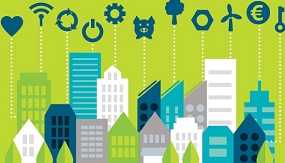
© SYKE
“It makes me happy to hear everyone’s examples” and “Let’s replicate each other’s models as much as we can”, were some of the comments heard in a remote meeting of pioneering circular economy municipalities on March 17. Representatives from ten municipalities shared their experiences and results from circular economy efforts in their biannual meeting. There were also discussions on the proposal for the circular economy strategic program.
Municipal work toward a more circular economy will result in a more sustainable use of natural resources. The pioneering municipalities were selected through the Circwaste project in 2017. The municipalities commited to the promotion of circular economy inside their boundaries, along with commiting to following the goals of the National Waste Plan. The pioneering municipalities are Ii, Jyväskylä, Kuopio, Lahti, Lappeenranta, Porvoo, Riihimäki, Rovaniemi, Turku, and Vantaa.
Lahti in the spotlight this year: European Green Capital 2021
Jenni Rahkonen from Lahti explained the actions and backgrounds for the Lahti Green Capital year. “The win was announced in the finals of the European Green Capital Award, where Lahti’s strengths were found to be in green growth, waste management, leadership, and air quality. For example, we can still work harder on more sustainable land use strategies”, says Rahkonen.
Circular economy is one of the Green Capital year’s four themes. “The roadmap for circular economy is in the works. We founded a development center for carbon neutral building and are looking for a coordinator in charge of soil and rock materials”, Rahkonen explains. Inclusive budjeting has also been implemented in Lahti, which means citizens have been asked to give their input in decision-making.
The circular economy program paves the way for municipal circular economy efforts
The suggestion for a strategic circular economy program and its implications for municipalities raised interest. Ministerial Adviser at the Ministry of the Environment, Taina Nikula, detailed the contents of the broad program package, and especially the idea of a new center of excellence to support the municipalities.
“The circular economy center of excellence will not be built from nothing, but the idea is to bring new elements to networks and existing proactive operations which have already garnered international attention. The network could promote concrete projects in municipalities through co-development, helping with different bottleneck solutions and supporting municipalities in the procurement of funding. The plans have not yet left the drafting stage, so we also invite municipalities to participate in further development”, Nikula explains.
The circular economy program reporting round is complete. The program is to be adopted by the Government during the spring.
The potpourri of municipal circular economy actions
The best part of the pioneering municipalities’ meetings is the round of updates. Here are some selected offerings from the round.
Vantaa has joined the Metropol politics carbon neutrality project group, where one of the goals is to substantially grow circular economy ecosystems. Additionally, Vantaa signed the Green deal contract regarding construction sites, mandating that, for example, work equipment shift to using biodiesel.
A roadmap of resource wisdom is in the works in the Turku area, in cooperation with ICLEI and Sitra. The roadmap is set to be finished by May. There will be 25 circular economy interventions, aimed to push the Turku area toward a more circular economy.
In Rovaniemi, a report on a circular economy park has been completed. Among other things, area biomass projections were assessed and a biogas plant master plan was formed. Biowaste separate collection rates were expected to rise in the future, although long distances pose a challenge in Lapland.
In Riihimäki, companies have actively participated in the RiiCycle network. Plastic collection from city buildings started in 2020, and it will start in early 2021 on the part of housing associations with five or more apartments. Starting this fall, circular economy will be included as a theme in teaching from pre-school to secondary education.
In Porvoo, work is starting on the construction the Kulloo business area. The area is part of the Kilpilahti bio and circular economy park. One of the goals is to process and use the extracted soil and rock material in the area.
In Lappeenranta, the Kukkuroinmäki biogas plant has been completed. They will begin selling biogas to consumers during the spring. By the summer, both regular and electric city bikes will be available for residents. The Lappeenranta circular economy roadmap is pending a report from the city organization.
The environmental program formed in Kuopio lays out the measures through which Kuopio is to become carbon neutral by 2030.
In Jyväskylä, Spinnova and Suzano are in the process of building a textile fiber factory, set to begin operations in 2022. The Jyväskylä area waste policy program is set to be finalized in May 2021. In the Kangas area, waste monitoring protocols developed in the Circwaste program have been implemented. These show monthly waste accrual rates for different waste collection sites.
In Ii, separate collection of biowaste has now been implemented for downtown row houses. 10 families from Ii have participated in the Sustainable Lifestyles Accelerator. The municipality of Ii is drafting a sustainable development financial statement where the most significant resource wisdom measures for 2016–2020 are laid out.
Further information